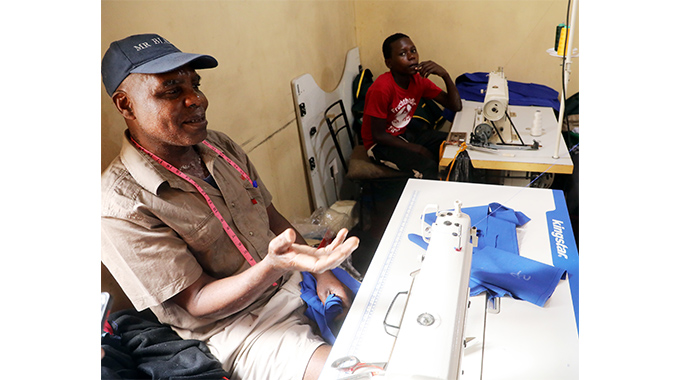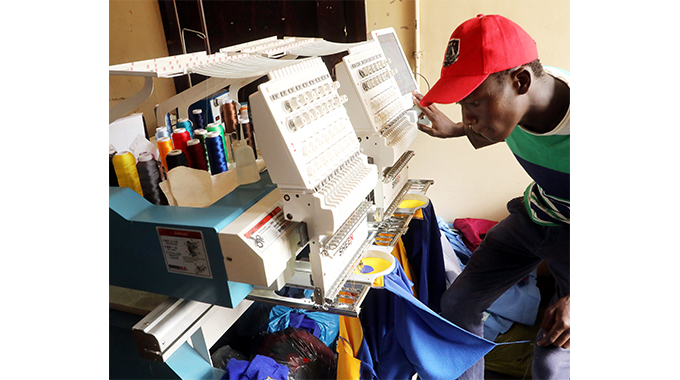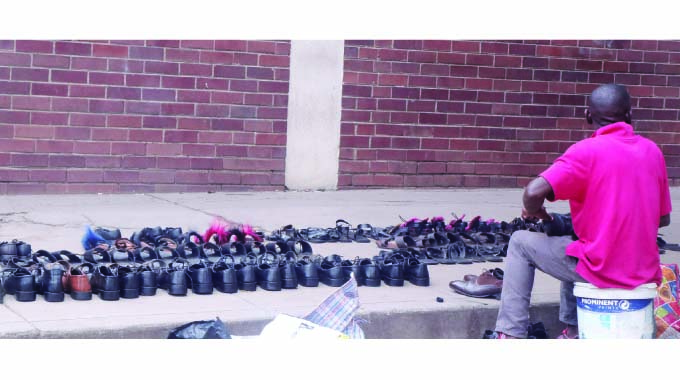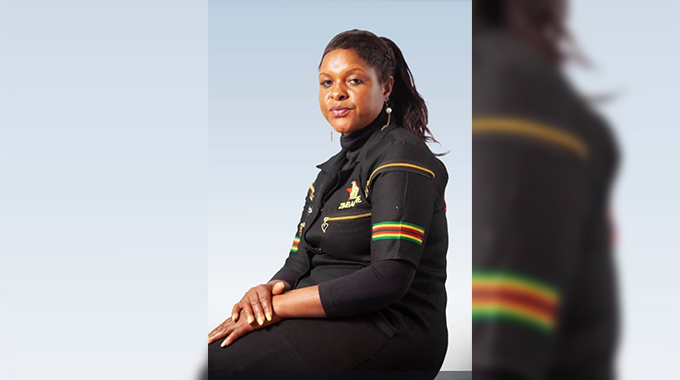Tailor empowers workers through machine loans

Nqobile Tshili, Chronicle Reporter
MR Blazer has become a household name in the production of school uniforms in Bulawayo and the entire Matabeleland region due to the quality of their schoolwear.
Behind the brand is Mr Francis Chiwanda of Matsheumhlope suburb who started off as a gardener. As part of economically empowering his employees, he has also introduced a scheme where he provides them with sewing machines for a period of five years to help them stand on their feet.
When Mr Chiwanda started sewing garments, it was more of a pastime until he decided to quit his job in 1997 to venture into the business on a full-time basis.
Despite a lack of formal qualifications in cutting and designing, Mr Chiwanda developed a passion for sewing before he honed his skills over a period of time. Today, the brand Mr Blazer has become a trusted partner in the education sector.
Through sewing, the former gardener has managed to establish himself and has even bought a house where he stays. A Chronicle news crew on Wednesday caught up with Mr Chiwanda at his shop in Bulawayo’s city centre during which he spoke of how he has, through tailoring, managed to transform lives.
“I worked as a gardener for 12 years and during my spare time, I would sew garments. In 1997, I quit my job and decided to venture into full-time tailoring, and this is how I ended up establishing Mr Blazer, which supplies uniforms to several schools,” he said.

Mr Blazer tailor uniform embroidery machine
“This is a very lucrative business, especially during this time of the year when parents and guardians will be busy running around as they prepare for a beginning of a new school term.”
Since embarking on his entrepreneurial journey, Mr Chiwanda has never looked back and he believes the sky is the limit.
At one time, Mr Chiwanda’s products were rejected by one of the major uniform retail shops in the city, but that did not dampen his spirits.
Ironically, the same shop later approached him for his services. At the moment, Mr Chiwanda has employed eight people on a permanent basis. After five years, he intends to release them so that they are able to establish their own businesses.

Mr Blazer shop owner. The shop caters for schoolwear in the entire Matabeleland region
“I realised that keeping a worker for too long will not benefit them since I won’t be able to provide them with a pension upon their retirement. I recruit students on attachment from colleges and these are the people that I will be working with,” he said.
“Anyone who spends five years working at my company gets a sewing machine, which they can use for a period of five years to start their business after which they can then return the machine. This is part of an empowerment programme that I’m rolling out.”
Mr Chiwanda said he introduced the programme after realising that most indigenous employers are no longer giving their workers pension payouts upon retirement.
“So, after working for me for five years, I believe someone would have acquired relevant skills to stand on their own. A countless number of people have benefitted from my scheme and I derive joy in seeing other people excelling in the craft,” he said.
Mr Chiwanda said there is a compelling need for financial institutions to support the textile industry by extending long terms loans for startups.
“We also need a lot of capital to scale up production. At the moment, we are not selling enough because of the disruptions that were caused by Covid-19. In fact, we don’t really need much in terms of capital to source the material,” he said.
“When you approach microfinance institutions, they are able to provide you loans, but unfortunately the money should be repaid within 30 days, which is not sustainable for business. We’ve heard that Government has institutions that provide loans to businesses, but we have never benefitted.”
Mr Chiwanda said access to raw materials is the biggest challenge for them, which subsequently hinder production and tapping into new markets.
He said while in the past they relied on local materials, the market is now demanding South African-sourced raw materials of high quality, which are expensive.
“We used to have queues in the past when schools were about to open as people would flood these major shops that provide uniforms, but this has changed as we now have many suppliers of uniforms,” said Mr Chiwanda.
One of the beneficiaries of Mr Chiwanda’s empowerment programme, Ms Sandra Dzapo said upon completing her studies, she almost lost hope after failing to secure a job.
“I had unsuccessfully applied to join the police, army and nursing. However, when I came to Mr Chiwanda, he changed my way of thinking and approach to life. He told me that employment is not the only route towards success,” she said.
“He told me that all I needed was a skill and that is how I ended up venturing into this tailoring business. He gave me a sewing machine, which I am using for a certain period after which I will return it.”
Through Mr Chiwanda’s empowerment drive, Ms Dzapo hopes to create employment opportunities for youths and other women.
Another beneficiary, Mr Justice Chiwandandebvu said through the empowerment scheme, he managed to establish his shop, tapping from the knowledge acquired from Mr Chiwanda.
“I have managed to even buy an industrial iron, which I use at work and life is much better. I’m no longer just working to buy groceries and pay rates, but I have managed to buy household property,” he said.
“I have since named my company Mr Blazer Junior in recognition of the empowerment that I received from Mr Blazer.”
@nqotshili












Comments